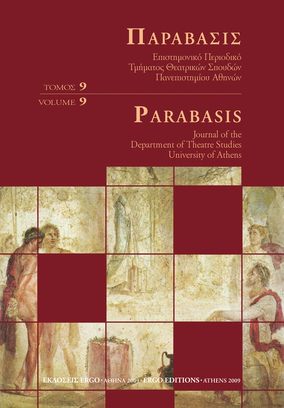A short outline of theatre history of the Balkan Peninsula : from renaissance to mid-war years
Part of : Παράβασις : επιστημονικό περιοδικό Τμήματος Θεατρικών Σπουδών Πανεπιστημίου Αθηνών ; Vol.5, No.1, 2004, pages 29-79
Issue:
Pages:
29-79
Section Title:
Μελέτες και άρθρα
Author:
Abstract:
This article presents some common elements of theatre history in South-Eastern Europe, insisting on a typological comparison of developments in the countries under the Habsburg Monarchy and the Ottoman Empire, especially in the period of their pursuit of national and cultural independence during the 19th century. Based on the traditions either of itinerant German companies or of school religious theatre of Catholics and Protestants and of shadow- puppet theatre, national drama and national theatre played an important part in the procedures of stabilisation of the national languages and served the demand for autonomy of the national cultures. The article surveys areas such as: a) popular shows of religious origin and shadow- puppet theatre, the only really elaborate form of popular theatre in the Turkish-occupied Balkans; b) the emergence of theatrical activity in territories under Habsburg or under Ottoman rule; c) traditions of drama translation and reception mechanisms through performances in foreign languages (German, French and Italian) in the Balkan theatre; d) the development of historical drama and patriotic tragedy as a means for the awakening of national self-consciousness; e) the invasion of Modernism, once the goal of national independence and consolidation had been completed and dramatists were free to experiment with modern stylistic and aesthetic possibilities; and, f) the typology of theatre building in the Balkan urban culture and city development. An extensive bibliography is published at the end of the article.
Subject (LC):
Keywords:
Βαλκανική Χερσόνησος
Notes:
Περιέχει βιβλιογραφία




